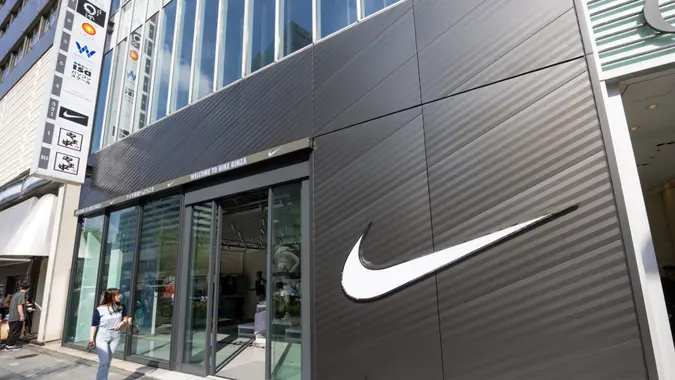Nike Stock: Experts Argue Pros and Cons of ‘Buying the Dip’ Amid Trump Tariff Drama

Commitment to Our Readers
GOBankingRates' editorial team is committed to bringing you unbiased reviews and information. We use data-driven methodologies to evaluate financial products and services - our reviews and ratings are not influenced by advertisers. You can read more about our editorial guidelines and our products and services review methodology.

20 Years
Helping You Live Richer

Reviewed
by Experts

Trusted by
Millions of Readers
Nike Inc. (NKE) has found itself caught in the crosshairs of ongoing tariff updates, particularly following the latest round of reciprocal tariffs imposed by the Trump administration. These tariffs, implemented on April 3, 2025, have heightened tensions between the U.S. and its trading partners, prompting some analysts to caution against investing in stocks that the economic fallout might impact.
For companies like Nike, which relies heavily on overseas manufacturing, the question arises: Is it a good time to buy Nike stock while it’s down, or should investors wait for more clarity on the future of trade relations?
The Impact of Trump Tariffs on Nike
In the latest chapter of the trade war, President Donald Trump introduced tariffs on a range of goods imported from foreign markets, including items produced by U.S. companies abroad, then paused them again, with the exception of imports from China.
These tariffs, which are aimed at challenging perceived unfair trade practices, are expected to have wide-ranging effects on companies like Nike, which sources a significant portion of its products from Asia, including China and Vietnam. According to an SEC filing, the clothing manufacturer sources 28% of its Nike-branded products from Vietnam, 16% from China and 15% from Cambodia.
Like many multinational retailers, Nike has been forced to confront a complex situation where rising import costs could eventually trickle down to consumers.
Nike’s stock price has faced some volatility since the announcement of these tariffs, with a noticeable dip in the days following the news. Nike stock dropped as low as $53.27 on April 8, marking its lowest closing price since 2017.
Since the beginning of the year, shares have decreased in value by over 25%. This has led to a familiar debate among investors: Is now the time to “buy the dip,” capitalizing on the lower stock price, or should they wait for clearer signals about the future of global trade policies?
Historical Context and Current Sentiment
To answer this question, experts are weighing in on both historical trends and current sentiments surrounding the stock.
On the one hand, Nike has a strong brand and global footprint that can help it adapt to rising costs. Many experts argue that the company’s ability to innovate, coupled with its deep ties to consumer markets, will allow it to absorb some of the additional financial pressures without drastically affecting its profitability.
On the other hand, the uncertainty surrounding the U.S.-China trade relationship and the broader global economic environment makes predicting Nike’s next steps more challenging. Some analysts caution that the Trump administration’s tariffs, which target a wide range of goods, could have a more significant impact on Nike’s profit margins than in previous years.
Additionally, there is the risk that further geopolitical instability could erode investor confidence in the retail sector as a whole, making it a riskier proposition to bet on stocks like Nike in the short term.
Expert Opinions: Is ‘Buying the Dip’ Wise?
Given the circumstances, some financial experts believe this dip presents an opportunity for investors to enter the market at a lower price, especially if they have a long-term investment horizon.
Strong Fundamentals
These analysts point to Nike’s strong fundamentals, including its brand equity, global distribution network and growing digital sales as reasons to remain optimistic.
Karl Farmer, vice president and portfolio manager at Rockland Trust, said, “If the investment time horizon is a few years, then yes, buy the dip. Nike (NKE) had many challenges to work on during 2025, even before tariffs entered the discussion. With the ever-shifting magnitude and potential duration of the overseas tariffs, it might be possible that a short-term bounce can be had, should this new setback be settled quickly.”
Strong Leadership
Before the tariff announcement, analyst Randal Konik told MorningStar that Nike was a top pick and that the new chief executive Elliott Hill would drive a surge in profitability, increasing Nike’s share of the market over the next few years.
Farmer added, “The new CEO has decades of experience with the company and is redirecting focus on the core sports brand, as well as repairing wholesaler relationships that were damaged recently with the direct-to-consumer initiatives.”
Nike Faces Real Challenges
These changes coupled with other market conditions could prove challenging, however.
Farmer said, “The economic headwinds are real and consumers might balk at new purchases while steps are being taken to reinvigorate the brand.”
Uncertainty and Volatility
Many argue that the tariff situation is far from resolved, and continued uncertainty could result in further volatility for Nike’s stock price. Additionally, if tariffs lead to higher consumer prices or lower demand for Nike products in key markets, the company’s growth prospects could be dampened.
For these reasons, some analysts recommend waiting for more clarity on the situation before making any major moves.
Farmer said any decision you make should be with a future lens. “As we move through the next few years, NKE should be able to return to above $3 and closer to $4 per share of earnings power and will command a better than market multiple for being the biggest powerhouse in its industry with a pristine balance sheet, as well.
“This is not a 2025 fix, but patient investors may be well-rewarded at these price levels,” he said.
Consider Your Financial Situation First
Bernadette Joy, a money coach and personal finance expert, said investors should exercise caution.
She told CNET, “Buying the dip instead of focusing on building cash savings for emergencies or paying off unnecessary debt is one of the biggest mistakes I see people make during economic downturns”.
The Bottom Line
As with any investment decision, timing is crucial when it comes to buying stocks in volatile times. Nike’s performance in the wake of the latest Trump tariffs has sparked renewed interest from both bullish and cautious investors.
While the company has shown resilience in the past, ongoing uncertainty in global trade, tariffs and the impact on profit margins adds an element of risk to the equation.
For those considering whether now is the right time to buy stocks on the cheap, it ultimately comes down to individual risk tolerance and investment strategy. Investors who believe in the long-term potential of Nike may view the current dip as an opportunity to capitalize on a temporary market reaction.
However, those concerned about the ongoing trade disruptions and their impact on Nike’s operations may prefer to hold off until the economic and political environment becomes clearer. Only time will tell how the latest round of tariffs will shape the future of Nike and the broader retail sector.
Editor’s note on political coverage: GOBankingRates is nonpartisan and strives to cover all aspects of the economy objectively and present balanced reports on politically focused finance stories. You can find more coverage of this topic on GOBankingRates.com.
 Written by
Written by  Edited by
Edited by 























